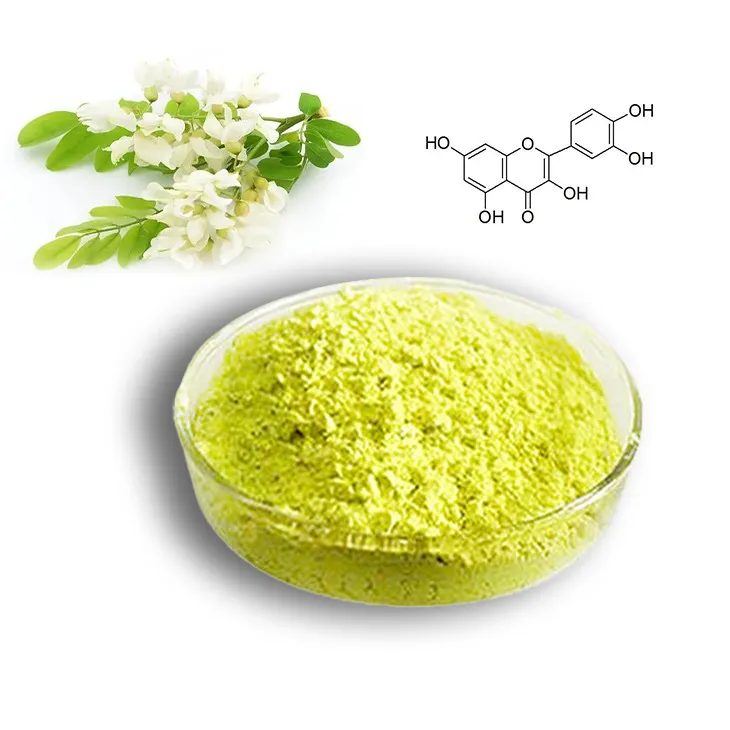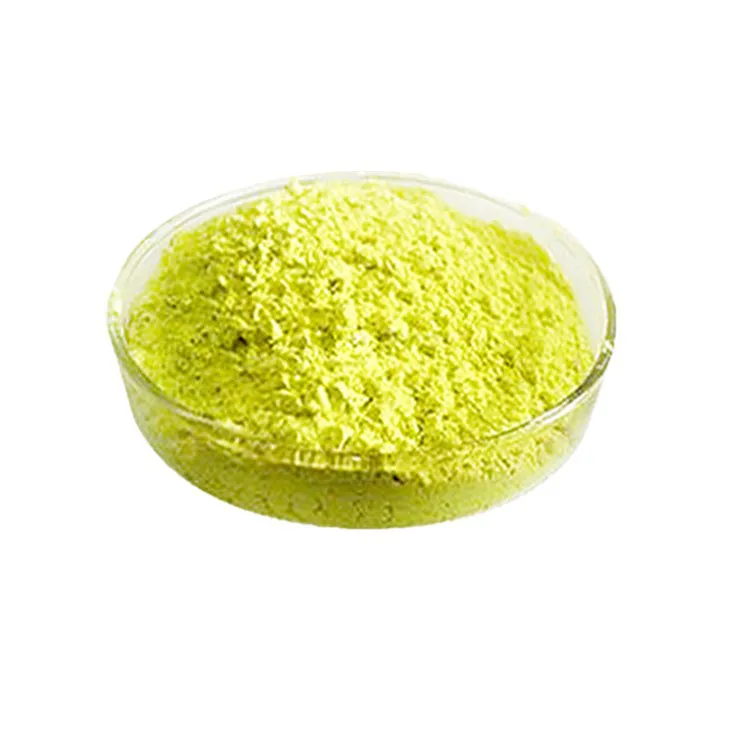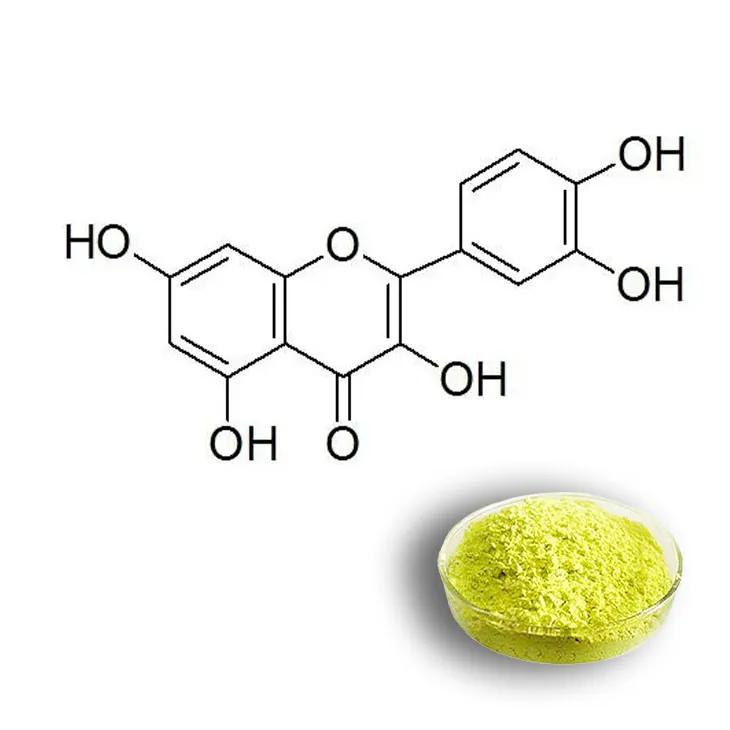- 0086-571-85302990
- sales@greenskybio.com
Understand the Benefits of Quercetin Supplements.
2024-11-12

Introduction to Quercetin
Quercetin supplement has been drawing the attention of health - conscious people lately. Quercetin, a type of bioactive flavonoid, is naturally abundant in various sources. It is found in many fruits, vegetables, and grains. For instance, apples, onions, and berries are some of the common sources of quercetin. This wide distribution in nature is a hint of its potential importance for human health.

Antioxidant Properties
One of the most significant benefits of quercetin is its antioxidant property.
- Oxidative damage is a constant threat to our body's cells. Free radicals, which are highly reactive molecules, are produced during normal metabolic processes as well as due to external factors like pollution, radiation, and certain chemicals. These free radicals can cause damage to our cells' membranes, DNA, and proteins.
- Quercetin, as an antioxidant, neutralizes these free radicals. It donates electrons to the free radicals, thereby preventing them from causing further harm. This process is crucial for maintaining the integrity of our cells and, ultimately, for our overall health and longevity.
- By protecting cells from oxidative damage, quercetin may also play a role in reducing the risk of chronic diseases. Many chronic diseases, such as cancer, heart disease, and neurodegenerative disorders, are associated with oxidative stress. Antioxidants like quercetin can potentially slow down the development of these diseases by combating oxidative stress at the cellular level.

Anti - Inflammatory Effects
Quercetin also exhibits remarkable anti - inflammatory properties.
- Inflammation is a natural response of the body to injury or infection. However, chronic inflammation can be harmful and is associated with a variety of disorders, including arthritis, inflammatory bowel disease, and asthma.
- Quercetin can interfere with the body's inflammatory pathways. It inhibits the production of certain inflammatory mediators, such as cytokines and prostaglandins. These mediators are responsible for triggering and maintaining the inflammatory response in the body.
- Studies have shown that quercetin supplementation may help in alleviating the symptoms of inflammatory - related disorders. For example, in patients with arthritis, quercetin may reduce joint pain and swelling by reducing the level of inflammation in the joints.

Immune System Modulation
Another important aspect of quercetin is its interaction with the immune system.
- Quercetin can interact with various immune cells, including macrophages, T - cells, and B - cells. Macrophages are the first line of defense against pathogens. Quercetin can enhance the phagocytic activity of macrophages, which means they can more effectively engulf and destroy foreign invaders such as bacteria and viruses.
- It also has an impact on T - cells and B - cells, which are crucial for the adaptive immune response. Quercetin can modulate the activation and function of these cells, helping to maintain a balanced immune response. This is important because an overactive or underactive immune system can lead to various health problems.
- By strengthening the body's defense mechanisms, quercetin may help the body to better resist infections. In addition, it may also play a role in autoimmune diseases, where the immune system mistakenly attacks the body's own tissues. Quercetin's ability to modulate the immune response may potentially be beneficial in these cases.

Benefits for Blood Sugar Regulation
Quercetin may also contribute to healthy blood sugar levels.
- For diabetics or those at risk of developing diabetes, maintaining proper blood sugar levels is crucial. High blood sugar levels over a long period can lead to various complications, such as nerve damage, kidney problems, and eye diseases.
- Quercetin has been shown to have an effect on glucose metabolism. It can improve insulin sensitivity, which means that the body's cells can more effectively respond to insulin. Insulin is a hormone that regulates blood sugar levels by facilitating the uptake of glucose into cells.
- Some studies have also suggested that quercetin may inhibit certain enzymes involved in carbohydrate digestion, which can help to slow down the absorption of glucose from the digestive tract. This can prevent rapid spikes in blood sugar levels after a meal.
Neuroprotective Potential
Research indicates that quercetin might have neuroprotective effects.
- The brain is highly vulnerable to damage, especially from neurodegenerative diseases such as Alzheimer's and Parkinson's disease. These diseases are characterized by the progressive loss of neurons and the impairment of brain function.
- Quercetin can protect neurons from various forms of damage. It may act as an antioxidant in the brain, reducing oxidative stress which is often associated with neurodegenerative diseases. Additionally, it may also have anti - inflammatory effects in the brain, which can further protect neurons from damage.
- Some animal studies have shown that quercetin supplementation can improve cognitive function and memory. Although more research is needed in humans, these findings suggest that quercetin may have potential in preventing or delaying the onset of neurodegenerative diseases.
Conclusion
Quercetin supplements offer a range of potential benefits. From its antioxidant and anti - inflammatory properties to its effects on the immune system, blood sugar regulation, and neuroprotection, quercetin shows great promise in promoting human health. However, it is important to note that while the research on quercetin is promising, more studies are needed to fully understand its mechanisms of action and its long - term effects. Additionally, before starting any supplement, it is advisable to consult a healthcare professional.
FAQ:
What is quercetin?
Quercetin is a bioactive flavonoid that is widely distributed in nature.
What are the main benefits of quercetin supplements?
Quercetin supplements have several benefits. Firstly, as an antioxidant, it protects the body's cells from oxidative damage. Secondly, it has anti - inflammatory properties which can relieve symptoms in various inflammation - related disorders. It can also interact with immune cells to modulate the immune response and strengthen the body's defense mechanisms. Moreover, it may play a role in promoting healthy blood sugar levels and might have neuroprotective effects.
How does quercetin act as an antioxidant?
Quercetin safeguards the body's cells against oxidative damage by neutralizing free radicals, which are unstable molecules that can cause harm to cells and contribute to various health problems.
Can quercetin supplements help with diabetes?
Yes, it may play a role in promoting healthy blood sugar levels, which can be beneficial for diabetics or those at risk of developing diabetes.
How does quercetin interact with the immune system?
Quercetin can interact with immune cells, modulating the immune response. It can strengthen the body's defense mechanisms by enhancing the function of immune cells and regulating the immune signaling pathways.
Related literature
- The Role of Quercetin in Health and Disease"
- "Quercetin: A Promising Bioactive Compound for Health Promotion"
- "Beneficial Effects of Quercetin on Inflammatory and Immune Responses"
- ▶ Hesperidin
- ▶ citrus bioflavonoids
- ▶ plant extract
- ▶ lycopene
- ▶ Diosmin
- ▶ Grape seed extract
- ▶ Sea buckthorn Juice Powder
- ▶ Beetroot powder
- ▶ Hops Extract
- ▶ Artichoke Extract
- ▶ Reishi mushroom extract
- ▶ Astaxanthin
- ▶ Green Tea Extract
- ▶ Curcumin Extract
- ▶ Horse Chestnut Extract
- ▶ Other Problems
- ▶ Boswellia Serrata Extract
- ▶ Resveratrol Extract
- ▶ Marigold Extract
- ▶ Grape Leaf Extract
- ▶ blog3
-
High purity olive leaf extract
2024-11-12
-
Lavender oil extraction method
2024-11-12
-
100% organic virgin sea buckthorn fruit oil
2024-11-12
-
Lotus leaf extract powder factory in China
2024-11-12
-
China aged garlic extract supplier
2024-11-12
-
Deer antler extract powder manufacturer
2024-11-12
-
Saw palmetto extract vs whole herb
2024-11-12
-
Hericium erinaceus extract powder
2024-11-12
-
Panax Ginseng Leaf Extract
2024-11-12
-
Uridine-5'-monophosphate Disodium salt
2024-11-12
-
Hedyotis Diffusa Extract
2024-11-12
-
Black Pepper Extract
2024-11-12
-
Artichoke Extract
2024-11-12
-
Red Wine Extract
2024-11-12
-
Phellodendron Extract
2024-11-12
-
Aguaje Extract
2024-11-12
-
Nettle Root Extract
2024-11-12





















